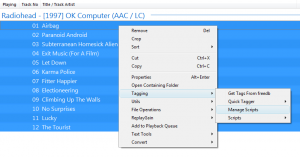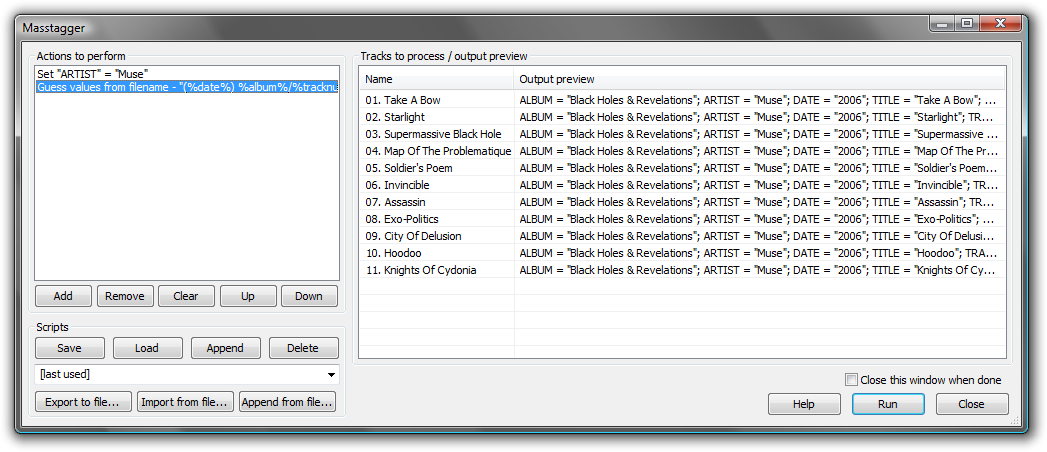Foobar2000:Components/Masstagger (foo masstag)
| foo_masstag | |
|---|---|
 foobar2000 component | |
| Developer(s) | Official |
| Release information | |
| Stable release | 1.7 |
| foobar2000 compatibility | |
| Minimum version | 0.9.5.x |
| UI module(s) | N/A |
| Additional information | |
| Use | Tagging |
| License | - |
| View all components | |
Masstagger
Masstagger is an advanced tool for editing the information of tags in multiple files. Note: It's not available as part of foobar2000 0.9.5 or newer installers. It is still however available from the official components page.
Masstagger's main limitation is lack of WYSIWYG editing of tags, making it inefficient for typical tag editing scenarios. You should use the Properties dialog instead unless you want to be able to quickly run predefined complex tagging tasks on your files.
Basic usage

To open the main Masstagger dialog, select the tracks you want to work with and choose the "Manage Scripts" command from the context menu, under the "Tagging" submenu.
The left box displays a list of actions that are about to be performed on your tags. The actions are performed in descending order - actions placed lower on the list will operate on tags already altered by actions placed higher on the list.
The "scripts" box contains commands that allow you to save the current chain of actions or restore a chain of actions that was saved earlier. There are two ways to store Masstagger scripts:
- In foobar2000 configuration - by using the "Save" / "Load" etc buttons - you can quickly load those scripts later, as well as access them directly from the "Tagging" / "Scripts" submenu of the context menu, as well as access them with keyboard shortcuts.
- In external files - by using the "Export to file..." and "Import from file..." buttons - such scripts can be easily interchanged between users or between different foobar2000 installations.
Available actions
Add value
Adds a new value to the specified metadata field. If the field already exists, a new value is added to its values; if it does not, it's created with a single value.
This is particularly useful when working with fields that often have more than one value, such as "ARTIST" or "GENRE".
For an example: an Add "GENRE" = "Rock" action will add "Rock" to the list of genres on affected tracks - if any of these tracks don't have a "GENRE" field yet, such field will be created, with one value equal to "Rock".
Auto track number
This gives the track number according to the order of the files in the selection.
Copy value
Copies one tag field to another.
Format value from other fields
This is where it becomes interesting. This option lets you enter a specific title formatting pattern for any tag field you wish to edit or create.
Guess values from filename
Automatically fills metadata values according to file paths, according to a guessing pattern that you specify.
Note that this is similar to the Automatically Fill Values dialog.
The guessing pattern syntax is NOT based on title formatting - functions or field remappings do not apply here.
You can put slash characters in the guessing pattern to also retrieve data from names of folders containing your files.
For an example, if your directory structure is formatted as "Artist\(Date) Album\N. Title.ext" - eg. "Muse\(2006) Black Holes & Revelations\01. Take A Bow.mpc", you can transfer all relevant information from file paths to tags using the following pattern: "%artist%\(%date%) %album%\%tracknumber%. %title%".
Guess values from other fields
Similar to "Guess values from filename", except it uses other fields - through a title formatting string - as a source, instead of file names.
Input data (one line per track)
Enter the data for each song with the pattern indicated, line by line, (one line per song as it is said). Don't worry about the length, the lines could be very long (only adds a vertical scroll bar if it is too long).
Remove all fields
Removes all tag fields (who would have guessed)
Remove all except for...
Does just as it says, removes all values and lets you specify wich ones not to remove in a second field in the following pattern ie.: "artist;title"
Remove field
Removes desired tag field.
Set value
Sets desired tag field (artist,album,custom,etc) to whatever you enter in the masstagger input window.


